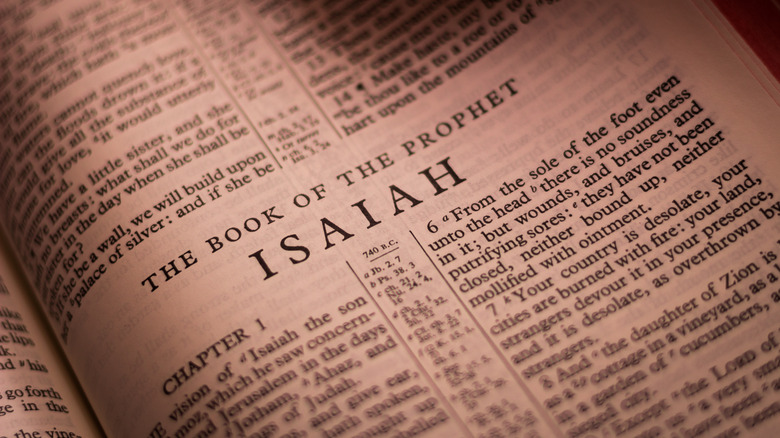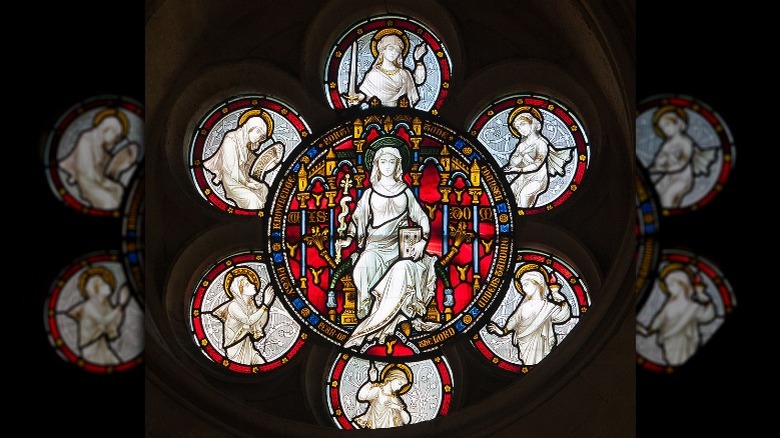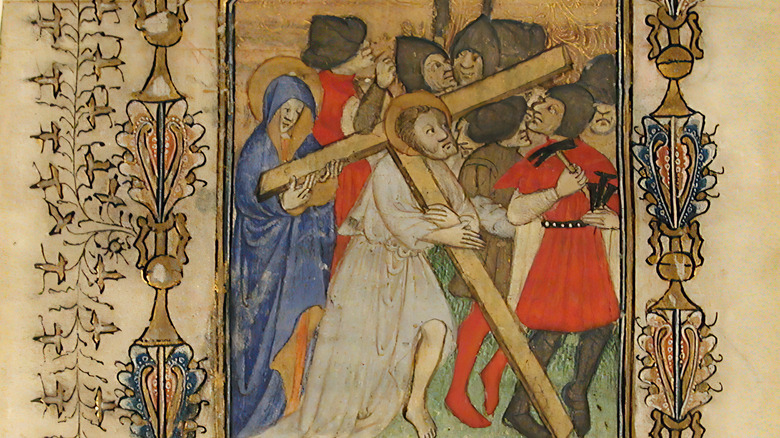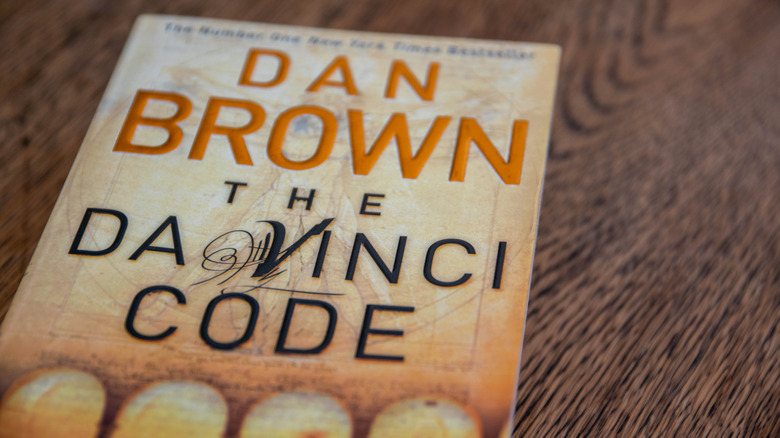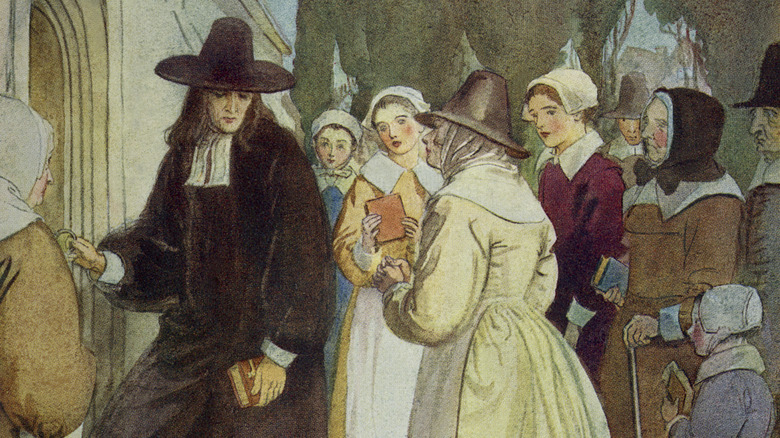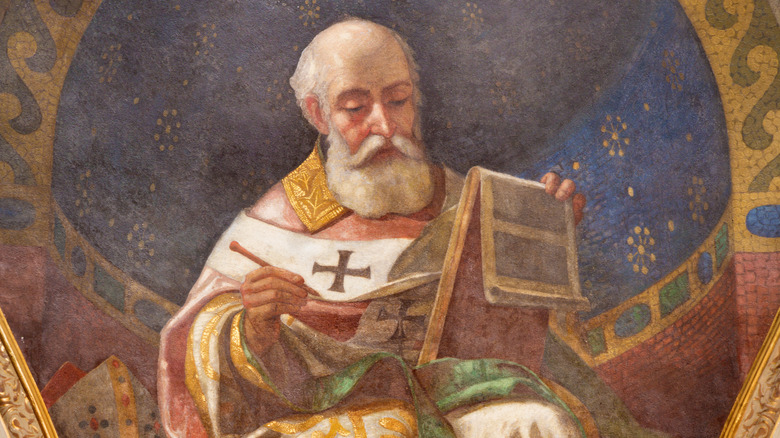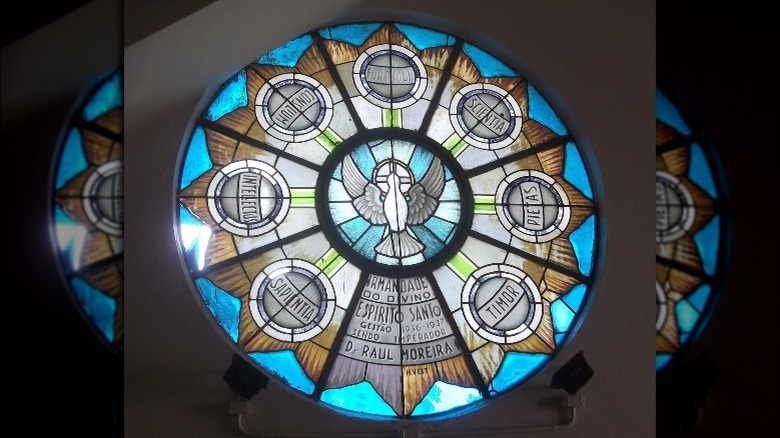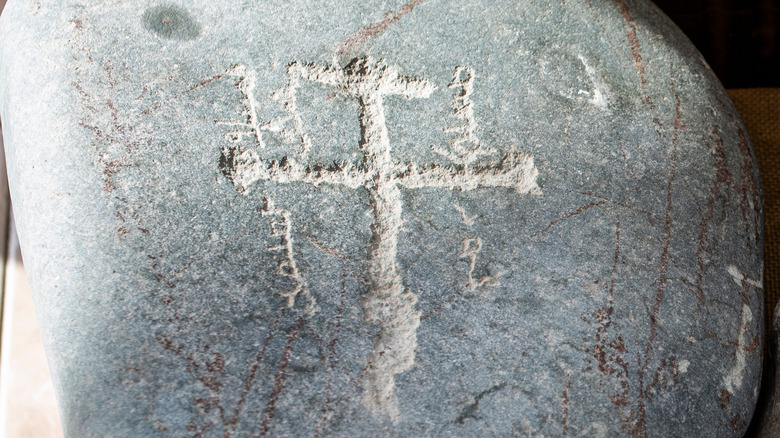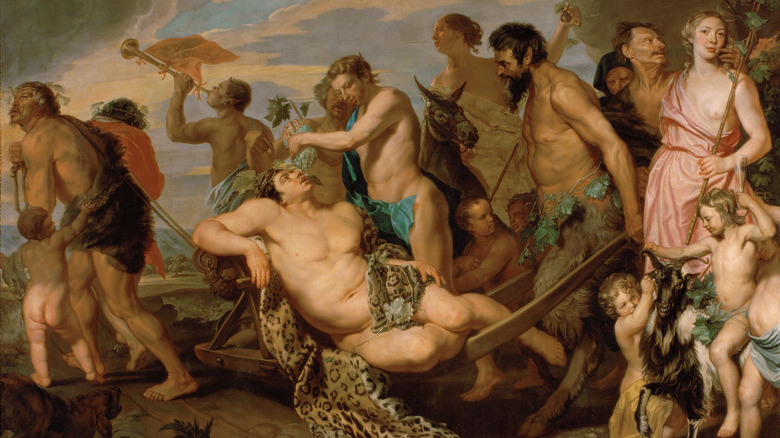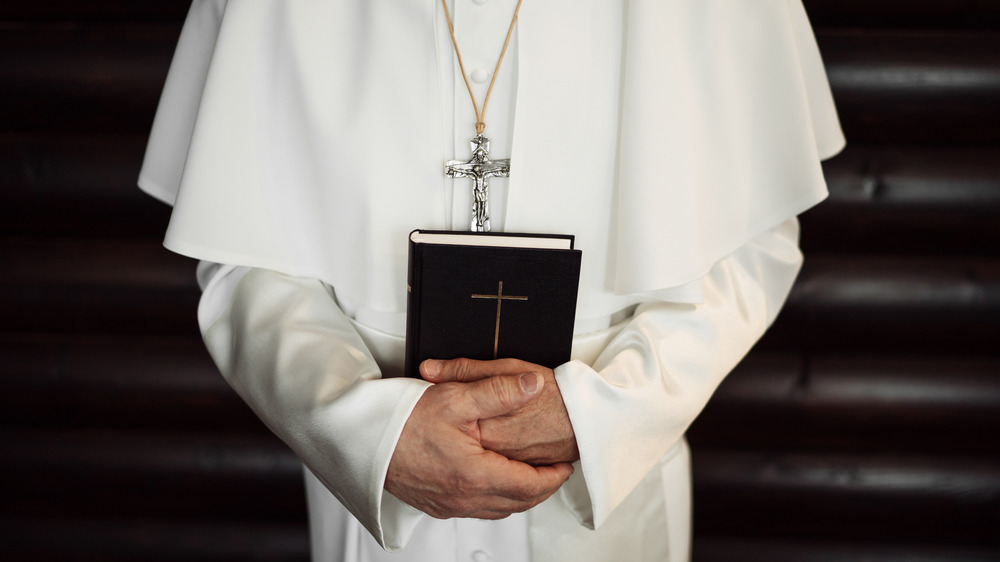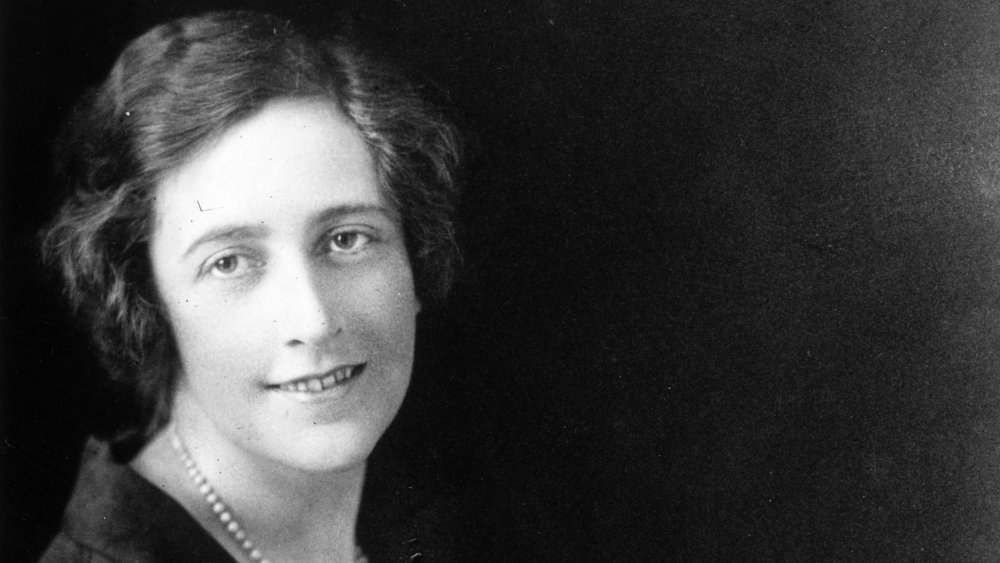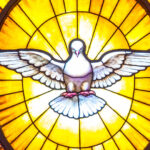
The Seven Gifts Of The Holy Spirit Explained
Christianity has many mysteries, from the Nativity to the Cross, Divine Providence to the Holy Trinity (via Banner of Truth). Some events prove hard to comprehend, such as Pentecost, when the first believers of Christ broke into a thunderous torrent of foreign languages. In the process, the Gospels say they brought the message of Jesus to awestruck, multilingual passersby, per PBS. At the heart of the Pentecostal mystery? Another hard to fathom concept … how the Holy Spirit fits into the mix and what it does.
A member of the Holy Trinity (which also includes God the Father and Jesus Christ), the Holy Spirit works in various ways in people’s lives in the Christian tradition. It manifests physically in the New Testament as a dove descending from Heaven. Known as the Ruach Ha-Kodesh in Hebrew (literally “the spirit of the Holy One”), the Holy Spirit proves a compelling and ambiguous force in the Brit Chadashah or New Testament (via Hebrew 4 Christians). Pope John Paul II would remind later believers that the Latin translation of the term ruach was spiritus, which means “breath.”
Other names for the Holy Spirit include the Ruach HaEmet (Spirit of Truth) and the Ruach Ha-Chokhmah (Spirit of Wisdom). It’s no coincidence that these titles allude to the seven gifts mentioned in Isaiah, per St. Joseph’s Modesto. After all, Christians believe the gifts manifest in believers through the power of the Holy Ghost. From wisdom to understanding, counsel to fortitude, here’s a rundown of this mystery.
The Old Testament's take on the gifts of the Holy Spirit
Where do we see the first glimpses of the Holy Spirit and the seven gifts? As the Institute for Faith, Work, and Economics explains, these first glimmers come in the Old Testament or Hebrew Bible. The Holy Spirit appears on numerous occasions, both in a creative capacity and as an inspirer of gifts in believers.
According to Genesis 1:1, the Holy Spirit — or in some translations a “mighty wind” — plays a pivotal role in the world’s Creation, per Aleteia. What’s the takeaway from all of this? According to “Gifts of the Spirit in the Old Testament” by Dr. Art Lindsley, “We should generally not divorce natural and ‘spiritual’ gifts.” Why? Because whether natural or supernatural in origin, virtues and gifts both have roots in the Holy Spirit.
In the Book of Isaiah (11:1-2) found in the Old Testament, the author lists Holy Spirit-inspired gifts, according to Bible Study Tools. These gifts get discussed in greater detail in the New Testament, providing the first spiritual context for these characteristics. How are these verses understood in a Christian context? As virtues that Jesus of Nazareth possessed in spades, sure, but they’re also qualities that his followers should have with the help of the Holy Spirit.
What the New Testament has to say about the gifts of the Holy Spirit
Paul discusses the seven spiritual gifts in the New Testament in 1 Corinthians 12, according to Bible Gateway. He likens believers to different parts of the same body, from eyes to ears and noses. Despite representing different members with unique functions, each piece assembles as a whole, creating one body. And each part contributes a specialty, whether it’s smell, hearing, sight, etc.
According to The Gospel Coalition, this analogy explains how the spiritual gifts work together for a better and more effective Church: “You are the body of Christ. Each one of you is a part of it.” In other words, the seven gifts of the Holy Spirit work through believers for the greater good. This approach also means Christians shouldn’t gloat about the gifts they receive. And they shouldn’t assume that some gifts prove better than others.
Moving on to 1 Corinthians 13 (everybody’s favorite wedding passage), Paul’s final point represents a colossal mic drop for all Christians. Why? Because he declares that all gifts amount to nothing without love. In other words, The Beatles got it right: “All you need is love.” According to Paul the Apostle (not McCartney), a believer shouldn’t measure their spirituality based on the gifts of the Spirit. Otherwise, it could lead to pride and disunity rather than love and unity.
Seven gifts and more in the Catholic tradition
There are no two ways about it. The numerical value seven is of great significance in the Bible. You don’t have to look far to find this number mentioned in many aspects of the faith (via Catholic Answers). For example, the number seven factors into the Beatitudes, the petitions from the Lord’s Prayer, the last words from the Cross, the virtues, and the deadly sins. (Drawing a blank on the last list? Brush up on those never-do sins while indulging in some young Brad Pitt with 1995’s “Se7en.”)
Where did the Catholic “monopoly” on the seven gifts start? With the 13th century scholar St. Thomas Aquinas. (In all fairness, there wasn’t much in the way of religious choice in the 1200s. But that’s another story.) Celebrated for centuries by Catholics everywhere, Aquinas’ “Summa Theologica” delved deeply into the seven gifts of the Holy Spirit. The interpretations he developed in this work remain a significant authority although a little “medieval.”
How do Catholics view the gifts today? The Archdiocese of Saint Paul & Minneapolis reports, “As Jesus was blessed with these gifts by his Father, every believer is blessed with the same gifts by the Holy Spirit.” For this reason, Catholics argue that the faithful get endowed with these gifts at Baptism. In other words, the gifts don’t exist in some spiritual vacuum. Instead, they remain interwoven with other aspects of the faith, including the Sacraments.
The first spiritual gift: wisdom
Wisdom is one of those traits you just can’t fake, and without it, you can quickly end up in a world of hurt. Of course, the need for wisdom gets magnified by your position and responsibilities in life. Maybe that’s why out of all the gifts God could have endowed him with, King Solomon asked for wisdom (via Bible Gateway). And tradition tells us he became renowned for this characteristic above all others. Of course, wisdom didn’t live and die with Solomon.
So, what does this term imply? Think of it as the “utterance of wisdom” or the “word of wisdom” (via Spiritual Gifts Test). Why? Because wisdom requires both the will and the intellect, permitting believers to see things (as much as humanly possible) from God’s perspective. According to Catholic Answers, “Wisdom is both the knowledge of and judgment about ‘divine things’ and the ability to judge and direct human affairs according to divine truth.”
What are some obvious signs that believers have the gift of wisdom? According to Christianity, Paul describes signs of wisdom as doing things pleasing to God, leading a worthwhile life, and increasing in knowledge of the Lord. In other words, it’s not about being a know-it-all or winning the “Religious” topics column of a Jeopardy tournament. Instead, it’s about recognizing godly principles and then putting them into practice through sound decision-making, per St. Joseph’s Modesto.
The second spiritual gift: understanding
When it comes to spiritual gifts, understanding is another loaded term. Some people immediately think of it in relation to knowledge, while others see it as empathy towards the needs and feelings of others. But what does the second gift of the Holy Spirit, understanding, mean in theological terms? It allows believers to get at the heart of revealed truths.
How does it differ from wisdom? Wisdom represents a thirst for the things of God, and it involves a healthy dose of contemplation. But understanding takes this longing for more of God to the next level. According to St. Joseph Catholic Church, the spiritual gift of understanding establishes the faith believers receive through the Sacraments in the Catholic tradition. “This great gift of understanding is this seeing of the heart and soul.”
Along with the ability to perceive stuff in new ways, the gift of understanding also lets believers judge matters accurately, per Openlight Media. That said, this understanding isn’t the result of deep study or a particular educational path. Instead, the Holy Spirit fuels this unquenchable desire to learn about God and Jesus through the Bible, meditation, and prayer.
The third spiritual gift: counsel
Counsel and prudence prove inextricable. Or, as Learn Religions puts it, “Counsel … is the perfection of the cardinal virtue of prudence.” All people can practice prudence, but only those gifted by the Holy Spirit will experience counsel. That’s because counsel is supernatural versus prudence, which is natural. What’s more, prudence takes time and requires considerable thought and soul searching. But counsel comes instantaneously and extraneously.
How does counsel interact with other gifts such as wisdom and understanding? In a nutshell, it takes both gifts to the next level, permitting people to get at the fundamental nature of the Christian faith’s great mysteries. But it doesn’t end there. Counsel allows believers to make decisions that bring glory to God (via John XXIII).
Besides rapid-fire discernment and actions dedicated to God, counsel also comes with a promise for believers who stand up for the Lord in faith, as reported by St. Joseph’s Modesto. What’s the promise? That the Holy Spirit will guide these individuals to defend the Church during times of hardship and persecution.
The fourth spiritual gift: fortitude
When you hear the word “fortitude,” what comes to mind? Perhaps something like bravery or courage? Or maybe you think about something like grit? While these are all good answers, Thomas Aquinas argued that fortitude or courage comes paired with the quality of endurance (via The Catholic World Report).
Best exemplified in the final hours of Jesus of Nazareth’s life, he faced excruciating punishments yet embraced the Cross, according to The Dialog. “Jesus was sustained by the gift of fortitude, God-given endurance to see the journey through to its glorious end.”
Interestingly, Catholicism also recognizes the virtue of fortitude per Catholic Straight Answers. So, what’s the contrast between the spiritual gift of fortitude and fortitude as a virtue? Unlike the natural virtue of fortitude that anybody can strengthen, the supernatural version perfects the concept. It provides a massive dose of energy, turning trepidation and confusion into strong, indefatigable resolve.
The fifth spiritual gift: knowledge
We’ve already covered “wisdom,” but where does “knowledge” fit into the mix? According to Shepherds of the Lost, knowledge permits the body of believers to recognize and gather necessary information. Then, it enables them to analyze and clarify said information in terms of their faith. This especially relates to knowledge with a direct impact on the Church.
What does this revelation look like? Discussed in the Gospels, the Book of Acts, and Paul’s letters to the Corinthians, the supernatural bestowing of knowledge comes in many forms (via the Blue Letter Bible). These forms may include a word, dream, or other communication, and they can convict an individual or a whole group of the faithful. Yet, it’s all for naught without the ability to discern God’s voice in contrast to human nature. So, the gift of knowledge comes accompanied by this ability, too.
Some serious consequences related to the gift of knowledge have occurred over the centuries. Misuse of the gift has even resulted in fracturing of the Christian faith. After all, one man’s word of knowledge is another man’s heresy, especially in the “case of secrets revealed.” And if the person or group to whom the knowledge has been disclosed swells with pride or becomes haughty over the whole thing, it can open a Pandora’s Box, spelling trouble for all involved. Just think first-century Gnostics, 20th century Branch Davidians, or even the outlandish premise of Dan Brown’s “Da Vinci Code” books (via Oxford University Press Scholarship).
The sixth spiritual gift: piety
Some people confuse piety with the outward display of religiosity. We’re talking black-and-white clad Puritans in wide-brimmed hats and buckled shoes. But according to St. Thomas Aquinas, this gift has nothing to do with superficial appearances (via Catholic Straight Answers). So, what is it? An authentic reverence for God coupled with a sincere belief He will provide for believers.
Many Christian scholars have written about this gift over the years, including Pope St. Gregory, who argued, “Through fear of the Lord, we rise to piety.” But how do we reconcile “fear” of God with the image of a loving deity portrayed in the New Testament? By relating to God as a loving and gracious father, as reported by Learn Religions. After all, father figures may instill respect, fear, and love simultaneously.
To take a page from the 1950s TV Guide, “Father Knows Best.” And that’s the sentiment that piety should inspire in believers. In other words, piety motivates people to pray and to attend Mass. Just as the Ten Commandments ordered the Jewish people to honor their mothers and fathers, so piety should supernaturally cause people to participate in activities God likes.
The seventh spiritual gift: fear of the Lord
We know what you’re thinking … Didn’t we just discuss fear of the Lord? Yep, but we can’t stop there. You see, fear of the Lord is considered so important, it also gets attention as one of the seven gifts (via St. Joseph Catholic Church). The concept requires more explanation, especially if you’re visualizing a tiny human crouched in a corner, hiding from God.
It’s an understatement when Catholic Straight Answers writes, “Perhaps no other gift of the Holy Spirit is so misunderstood.” After all, few terms prove as loaded as the word “fear.” What does it refer to? The believers’ reaction to the majesty and glory of God. Hint: This reaction should involve “awe and wonder.” These feelings should lead the faithful to a deeper appreciation and love of the Lord.
What’s more, Catholics see a fascinating link between fear of the Lord and the virtue of hope. While many of us would initially think of fear and hope as opposites, church fathers have long argued that recognizing the greatness of the Lord leads to hope in the promises He made to His followers. St. Thomas Aquinas classified the seven gifts of the Holy Spirit in terms of their function. The first four dealt with the intellect. And the last three (including the fear of the Lord)? Aquinas argued that they “direct the will toward God.”
Saint Thomas Aquinas and Saint Augustine on the gifts of the Holy Spirit
In the “Summa Theologica,” Thomas Aquinas discusses the seven spiritual gifts in the context of the virtues. For example, he associates the gift of wisdom with charity and the gifts of knowledge and understanding with the virtue of faith. Great points, for sure. But this can leave you scratching your head about the inherent differences between the gifts and the virtues.
The Reverend Brian Shanley compares them this way, “What the gifts do over and above the theological virtues (which they presuppose) is dispose of the agent to the special promptings of the Holy Spirit … the gifts are necessary for the perfect operations of the virtues” (via Meditations on Catholicism). In other words, virtues come through willpower and are vulnerable to human weakness and challenging circumstances. But the gifts remain divinely inspired.
What did Saint Augustine have to say about the seven gifts of the Holy Spirit? He advocated for viewing them within the context of the seven Beatitudes. According to Restless Pilgrim, Augustine put it this way, “The number of these sentences should be carefully attended to; to these seven degrees of blessedness agree the operation of that seven-form Holy Spirit which Isaiah described.” This interpretation adds richness and depth to the understanding of both. It also harmonizes with his contention that the New Testament reveals the Old Testament (via Crisis Magazine).
Why the seven gifts of the Holy Spirit still matter
The seven spiritual gifts first show up in the Old Testament’s Book of Isaiah, but information about the Ruach Ha-Kodesh goes back to the first verses of Genesis (via St. Joseph’s Modesto). In these verses, the Spirit shares a creative role with the Father and the Son. As a result, both natural and supernatural gifts have a connection with the Holy Ghost.
Catholicism continues to place a strong emphasis on cultivating the virtues (natural qualities) and perfecting them through the seven spiritual gifts (supernatural manifestations). But many Protestant sects of Christianity don’t give them much of a second thought. As Dr. Roger Barrier wrote for Crosswalk, “It breaks my heart that the spiritual gifts don’t seem to be taught or emphasized much throughout Christendom these days.”
Why does Barrier feel so passionate about the gifts? Because he argues that these gifts are “critical for the Church to function properly in society.” That said, believers also need to be careful when attempting to view their spirituality through the lens of these seven gifts. Otherwise, it can lead to everything from superficial religiosity to big egos, divisions within the Church to full-on crazy cults that make the nightly news. But that’s another story for another time.
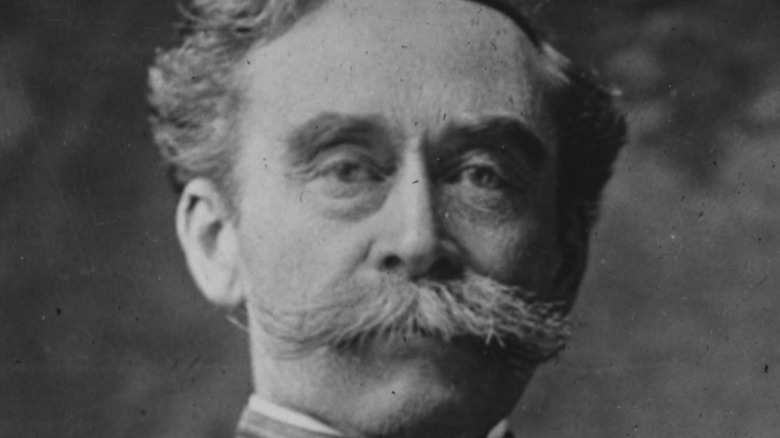
How Many Trips Did Explorer Robert Peary Make To The Arctic?

How The Amish Drastically Affect The Environment

The Real Reason John Walker Lindh Joined The Taliban

The Sad Thing That Happened To Stingrays After Steve Irwin's Death

What Does The Bible Actually Say About Polygamy?
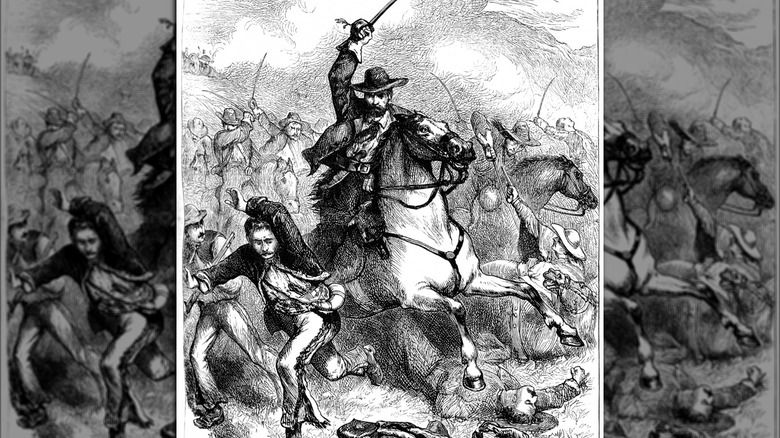
This President Was One Of The Mexican-American War's Harshest Critics

Here's What Happens When You Shower In Space

The Unusual Truth Of The Veiled Prophet Ball

Inside The Amazing Artistry Of 3D Tattoos

Why Gurkhas Are Considered The Toughest Soldiers In The World
